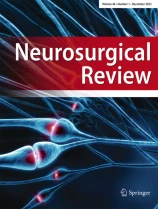Neurosurgical Review has begun retracting scores of commentaries and letters to the editor after getting inundated by AI-generated manuscripts. At the top of the affiliations list: Saveetha University in Chennai, India, an institution that, as we reported with Science in 2023, engages in aggressive self-citation.
At publication time, Neurosurgical Review had retracted 129 papers so far this year. The journal, a Springer Nature publication, paused acceptance of letters to the editor and commentaries last fall.
In December we reported in another collaboration with Science that Neurosurgical Review paused accepting commentaries and letters to the editor last year after getting overwhelmed by submissions that appeared to be generated using large language models (LLMs).
“A number of articles have been retracted, but our investigation is still ongoing, and further editorial action will be taken as appropriate,” Sverre Klemp, an executive publisher at Springer Nature, told us.
The notices for the new retractions state:
The Editor-in-Chief has retracted this article. An investigation by the Publisher found that a number of articles, including this one, that comment on research published in the Journal were submitted over a short space of time and show strong indications that the text was generated by a large language model (LLM) without proper disclosure by the authors. These articles are therefore in breach of the Journal’s editorial policy and are being retracted.
Klemp told us the journal is continuing to investigate, but declined to share additional information.
Of the retracted commentaries, 87 were written by researchers from Saveetha and 35 of them were written by two researchers at Saveetha Dental College and Hospital, Hethesh Chellapandian and Sivakamavalli Jeyachandran, according to the Retraction Watch database.
In an email, Jeyachandran told us he disagreed with the retractions. He called the decision to retract his articles because he didn’t disclose the use of LLMs “highly troubling. … Retractions are meant for serious misconduct — fabricated data, plagiarism, or harmful misinformation — not procedural oversights that do not impact the scientific record.”
Jeyachandran said the retracted articles were commentaries, not studies, with “no instances of data fabrication, plagiarism, or breaches of journal policy. If journals begin retracting publications simply over undisclosed AI assistance, the boundaries between acceptable and unacceptable practices become increasingly unclear.”
According to the author submission guidelines for Neurosurgical Review:
Use of an LLM should be properly documented in the Methods section (and if a Methods section is not available, in a suitable alternative part) of the manuscript. The use of an LLM (or other AI-tool) for “AI assisted copy editing” purposes does not need to be declared. … In all cases, there must be human accountability for the final version of the text and agreement from the authors that the edits reflect their original work.
Saveetha and its dental school have been the subject of allegations of citation stacking, as well, as we reported in a 2023 collaboration with Science. Citation stacking happens when researchers include unnecessary citations to bolster metrics, including self-citation. Following our investigation, retractions increased for authors affiliated with the institution.
In 2024, journals retracted at least 80 papers from Saveetha authors. The retractions from Neurosurgical Review attributed to researchers at the university bring the 2025 total to 90, less than six weeks into the year.
In January, Saveetha was among the schools identified as engaging in “questionable authorship practices” in a study published in January in Quantitative Science Studies, including a 100% growth in research output from 2019 to 2023.
A retraction for Saveetha researchers in another journal, Heliyon CellPress, highlighted one such practice — citation stacking. The retraction notice, issued January 30, for the 2024 paper “MPPT efficiency enhancement of a grid connected solar PV system using Finite Control set model predictive controller” stated the article was retracted at the request of the editor-in-chief:
An investigation conducted on behalf of the journal by Elsevier’s Research Integrity & Publishing Ethics team found a significant increase of citations to papers published by the author, Ayodeji Olalekan Salau, between the original submission and the revised version of this article. In summary, zero papers by the author were cited in the original version of the article. This increased to ten papers in the revised version of the article. The investigation also found phrases that make some passages in the article difficult to parse. The authors were requested to explain the use of these passages of text but were unable to do so. The Editor has lost confidence in the findings of the article and has determined that it should be retracted.
An Elsevier spokesperson told us the retraction followed an “audit of articles published in Heliyon” and that the investigation into the journal was “still ongoing.”
Although the notice stated both authors disagreed with the retraction, Girma Alitasb, the co-author, told us in an email he “respect[s] the journal’s decision.”
Alitasb, a researcher for Debre Markos University in Ethiopia, said he was “not involved in any intentional citation manipulation. During the revision stage, my focus was solely on addressing the reviewers’ comments, and I was unaware that additional citations were added. These changes were made by the corresponding author without my approval.”
Salau did not respond to our request for comment.
Like Retraction Watch? You can make a tax-deductible contribution to support our work, follow us on X or Bluesky, like us on Facebook, follow us on LinkedIn, add us to your RSS reader, or subscribe to our daily digest. If you find a retraction that’s not in our database, you can let us know here. For comments or feedback, email us at [email protected].

It seems to be the same country hitting the headlines again and again.